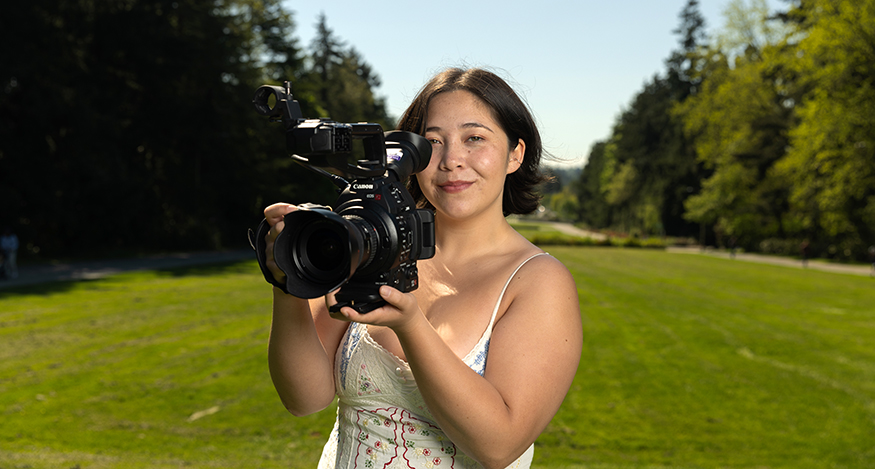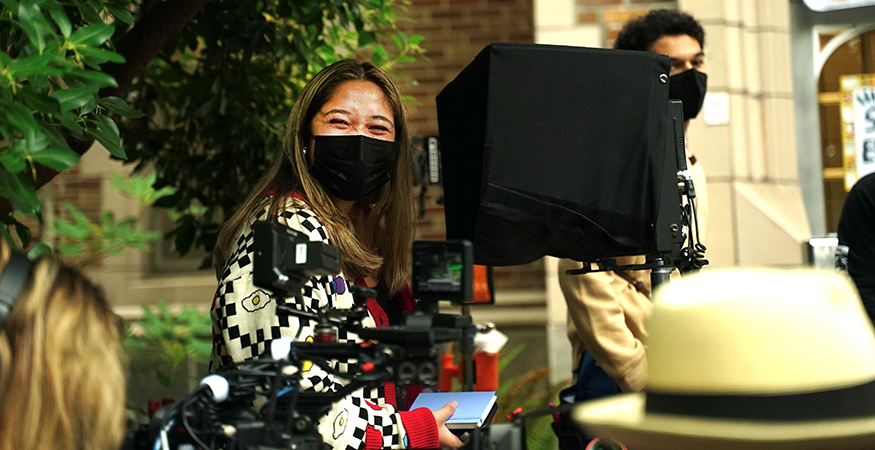
Many aspiring filmmakers move to Southern California in search of professional opportunities. UW senior Makenna (Kenna) Fojas did the opposite. Raised in Mission Viejo, California, where her high school had a robust film program, Fojas moved to Seattle to attend the University of Washington — and launched her film career as an undergraduate.
“I wanted something different,” Fojas says of her decision to attend the UW. “I wanted to see who I was outside of California.”
Fojas, who graduates this month with majors in cinema & media studies and psychology in the UW College of Arts & Sciences, has worked on several short films while in school, first as art director, then as producer. For her next project, to be filmed this summer, she is the writer and director.
“I’ve been interested in films my whole life,” Fojas says. “I love that filmmaking involves every medium: music, visual design, performance, writing, and photography. It is the place where they can all exist at once and all be valuable.”
Looking Inward during Quarantine
Fojas had a jump start on filmmaking thanks to her high school film program, which covered the basics with professional cameras and professional film editing software. “It was an amazing program,” Fojas says. “I guess it’s a product of living so close to the entertainment industry.”
At the UW, Fojas was drawn to the Department of Cinema & Media Studies (CMS), which focuses on film history and theory rather than production. She remembers being wowed by her first CMS course, Feminist Approaches to Media, taught by assistant professor Mal Ahern. “Taking that class locked me in,” Fojas says. “Mal also taught my senior capstone course. I just feel very lucky to have taken her classes.”
As director, I want the film set to be somewhere I want to be, with people I want to be with, who want to learn together.
As that course wrapped up, Covid arrived and changed everything. All of Fojas’s classes were taught remotely the next quarter, her third at the UW. Fortunately, the courses she’d signed up for were suited to that difficult moment: a CMS screenwriting course, a philosophy course on existentialism in film, and a psychology course on biopsychology, focusing on the biological basis of behavior.
“It was the beginning of quarantine, and I was digging into my soul for my screenwriting course and the existentialism class,” Fojas recalls. “And then biopsych, that was a great accent to those two classes. Sometimes I would confuse which information came from which course, they all felt so intertwined to me. I was in quarantine absorbing all of this, and it really helped set me on the path I’m on now, which is committed to being myself and letting that take me where I go.”
Film Opportunities, Close to Campus
Sophomore year, Fojas learned that a group of screenwriting students, hungry for production experience, planned to produce a short film with encouragement from their screenwriting instructor, Warren Etheredge. Fojas volunteered to work as an assistant in the production team’s art department, but her pitch to the team was so thorough that they asked her to lead the art department instead.
It was a dive into the deep end for Fojas, but guidance from local production designer Lisa Hammond was a huge help. Fojas connected with Hammond through Etheredge, who showed her how beneficial mentorship could be.
“Seattle’s film community is very small, and so getting to know one professional who is willing to mentor students gives you openings to other professionals in the industry,” Fojas says. “Seattle has just been a really comforting environment for this.”

That film project led to another. This time Fojas was producer, with responsibilities that ranged from hiring the crew to coordinating the shoot to making sure everyone’s needs were met during filming. She also raised more than $7,000 through crowdfunding to cover expenses. That short film, Hapa, is about a mixed girl’s first day of middle school.
“She’s Japanese and white,” Fojas says. “You experience the day with her and her friend Grace, who is Filipino and Black. I’m Filipino, so that was a nice thing to incorporate during casting. It’s about the ambiguous signals that come out that day about their race and their looks, which leave them with a sense of confusion.”
Hapa is currently being submitted to film festivals, with CMS covering some of the costs of those submissions. But Fojas is already on to her next project.
Collaborating with an Idol
Fojas is the writer and director on her newest project, Peach Fuzz. The best part, she says, is the opportunity to work with Kirsten (Kiwi) Smith, whose career as a screenwriter includes classics such as “10 Things I Hate About You” and “Legally Blonde.”
Fojas met Smith while volunteering at Walla Walla Movie Crush, an annual film festival co-founded by Etheredge. Fojas played it anything but cool when she met Smith, whose work she had admired for years.
“10 Things I Hate About You changed the way I look at film,” Fojas says. “So when I met Kiwi, I cried. I said ‘I love you.’ The last night of the festival, there was a karaoke party and I sang her a song! I’m surprised how bold I was, to be honest.”
That boldness paid off. Fojas and Smith became friends and stayed in touch. When Fojas decided she wanted to direct, she sought advice from both Smith and Etheredge to find a suitable script. But none of the scripts she read clicked. Around the same time, Fojas told Smith how much she loved “The Geography of Girlhood," a poetry book Smith had written. Smith suggested that Fojas adapt the book into a short film and encouraged her to write the screenplay.
“Kiwi had never adapted her poetry to the screen before, so I felt very honored,” Fojas says.
I had to decide I wanted to direct. No one was ever going to tell me I should direct or make that happen. You have to decide for yourself what you want and trust who you are.
Fojas describes the film as a story of a preteen girl who watches her older sister have experiences she is desperate to have, leading the younger sibling to make some poor choices. “It’s a coming-of-age story,” she says. “There’s no way to find out who you are without doing some things that aren’t you. Peach Fuzz is about being in that situation and using that frustration to try again, to try something new.”
Peach Fuzz will be filmed this summer in Seattle. The crew includes current UW students but also professionals with more experience. After working on multiple film sets, Fojas knew what she was looking for when building her team.
“We’ve made sure that the crew is a myriad of different social identities and backgrounds so the perspective we’re showing isn’t just one specific experience,” Fojas says. “As director, I want the film set to be somewhere I want to be, with people I want to be with, who want to learn together.“
For other students interested in filmmaking, Fojas offers some hard-earned advice.
“Start believing in yourself,” she says. “Because if you don’t think there’s a place for you in the industry, there won’t be. I had to decide I wanted to direct. No one was ever going to tell me I should direct or make that happen. You have to decide for yourself what you want and trust who you are.”
Want to learn more about Kenna Fojas? Read a Q&A with Fojas on the UW Department of Cinema & Media Studies website or follow her on Instagram at @makfo. For updates on Fojas' newest film project, visit the Peach Fuzz website and the Peach Fuzz Instagram page.
More Stories

What Students Really Think about AI
Arts & Sciences weigh in on their own use of AI and what they see as the benefits and drawbacks of AI use in undergraduate education more broadly.

AI in the Classroom? For Faculty, It's Complicated
Three College of Arts & Sciences professors discuss the impact of AI on their teaching and on student learning. The consensus? It’s complicated.

Bringing Music to Life Through Audio Engineering
UW School of Music alum Andrea Roberts, an audio engineer, has worked with recording artists in a wide range of genres — including Beyoncé.
